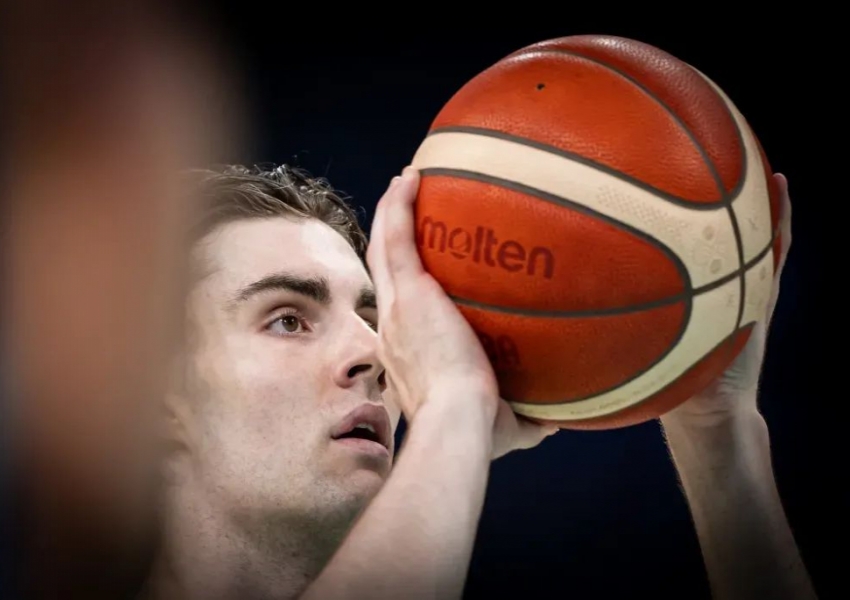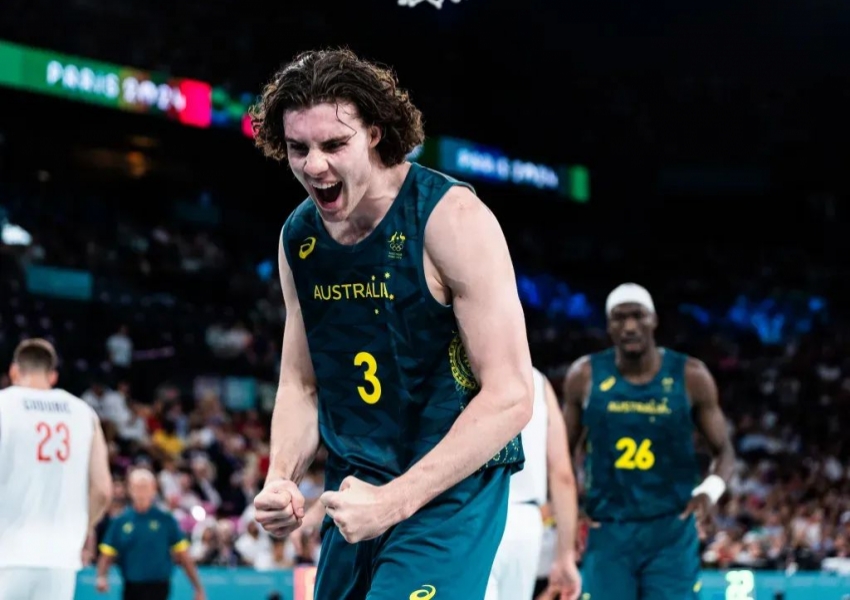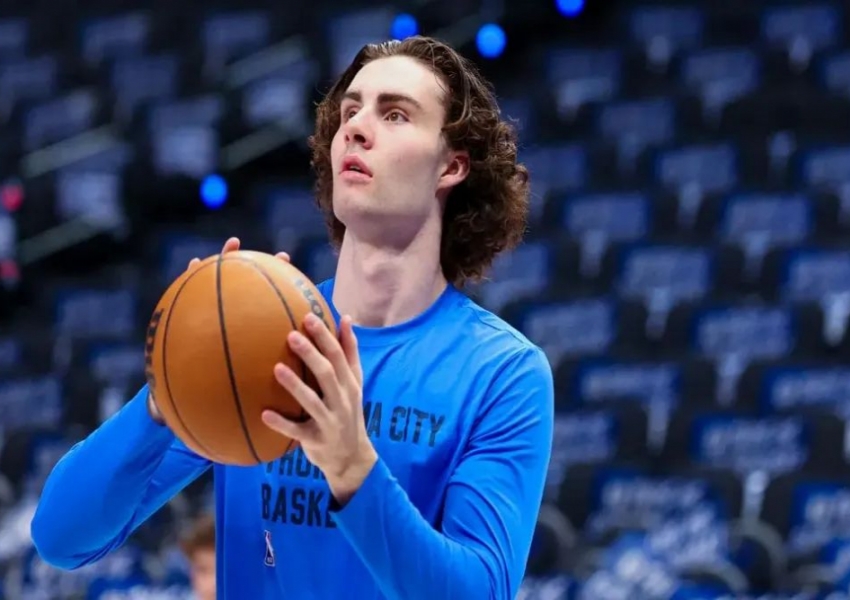Underestimated: Could Josh Giddey Be the Next FIBA Superstar?
When you think of Australian basketball, one name immediately comes to mind for most fans: Patty Mills. The 36-year-old veteran has been the face of Australian basketball for years, delivering one stellar performance after another on the international stage. This year, Mills played his final Olympic games, and he did not disappoint. In four games, Mills averaged 16.5 points, 2.3 rebounds, and 1.0 assists, with an impressive 40.9% shooting from beyond the arc.

However, as much as Mills has been the heart and soul of the Australian national team, it's becoming increasingly clear that he’s no longer the face of the future. That distinction now belongs to a much younger talent, recently turned 22: Josh Giddey. Giddey’s performance at the Olympics this year was nothing short of a breakout, and it signals that he could very well be the centerpiece of Australian basketball for years to come.

Giddey's Breakout on the International Stage
At the Olympics, Giddey shined brightly, averaging 17.5 points, 7.8 rebounds, and 6.0 assists per game. He led the Australian team in scoring and ranked 12th overall among all players. His rebounding and playmaking were equally impressive, ranking 7th in both categories. This performance was a far cry from the player many NBA fans had grown accustomed to—a player known for his height, excellent court vision, and rebounding ability but also criticized for his lack of shooting and overall efficiency.

In the NBA, Giddey has often been labeled as a talented but flawed player. His passing and rebounding for a guard are exceptional, especially given his 6’8” frame, but his shooting has been a glaring weakness. In the NBA, Giddey’s three-point shooting and scoring efficiency have been inconsistent, leading to concerns about his ceiling as a player. However, the FIBA game seemed to unlock a new level in Giddey’s play. Not only did he leverage his natural talents, but he also displayed a newfound shooting ability. During the Olympics, Giddey averaged 2.3 made three-pointers per game, with an outstanding 47.4% accuracy from beyond the arc.
What’s even more impressive is the quality of competition Giddey faced. Australia’s opponents included some of the best teams in the world, such as Spain, Canada, Greece, and Serbia. In these matchups, Giddey consistently delivered. Against Spain, he shot 7-for-12 from the field, finishing with 17 points, 8 rebounds, and 8 assists, with a game-high +15 in the plus/minus category. Against Canada, Giddey was equally effective, scoring 19 points on 7-for-14 shooting, including 3-for-7 from three-point range, along with 7 rebounds and 6 assists.
Even in the quarterfinal loss to Serbia, Giddey was a standout, playing 33 minutes and recording 25 points, 5 rebounds, and 4 assists on 11-for-20 shooting and 3-for-5 from beyond the arc. His ability to perform at such a high level against top-tier international competition suggests that Giddey could be a major force in FIBA tournaments for years to come.
A Tale of Two Josh Giddeys: FIBA vs. NBA
Giddey’s FIBA success contrasts sharply with his recent struggles in the NBA. During the 2024 NBA playoffs, Giddey became a liability for the Oklahoma City Thunder, particularly in their series against the Dallas Mavericks. Mavericks coach Jason Kidd relentlessly targeted Giddey’s weaknesses, and the young guard’s playing time dwindled as a result. In the six-game series, Giddey averaged just 12.6 minutes per game, a far cry from his usual role. His stats were underwhelming: 6.2 points, 2.7 rebounds, and 1.3 assists per game, with shooting splits of 43.2% from the field and a dismal 18.8% from three-point range.
The Thunder, recognizing the limitations in Giddey’s game, made a significant decision in the offseason. They traded him to the Chicago Bulls in exchange for Alex Caruso, without acquiring any draft picks in return. This move signaled that the Thunder no longer saw Giddey as a key part of their future. The trade was partly motivated by the Thunder’s desire to have Giddey accept a reduced role coming off the bench, which he reportedly refused.
Going into the Olympics, Giddey’s reputation was at a low point. Expectations for him were muted, especially after his playoff struggles and subsequent trade. The narrative around Giddey had become increasingly negative, with many questioning his potential to succeed at the highest level. However, his performance at the Olympics may have changed that perception.
The Trade and Its Implications for Giddey and the Bulls
The trade that sent Giddey to Chicago could be a pivotal moment in his career. For the Bulls, acquiring Giddey represents a gamble on untapped potential. Chicago is in a rebuilding phase after losing key players like DeMar DeRozan and Alex Caruso. Giddey, with his youth and potential, could be a centerpiece in the Bulls' future plans. If he can continue to develop and refine his game—particularly his shooting—he might exceed expectations and become an All-Star caliber player.
For Oklahoma City, the trade marks a transition from accumulating young talent to focusing on winning now. Caruso is a proven veteran who brings defense, leadership, and experience—qualities the Thunder need as they aim to make a deeper playoff run. While Giddey’s departure may seem like a step back in terms of long-term potential, it’s a clear signal that the Thunder are prioritizing immediate success.
Giddey’s move to Chicago also presents an opportunity for him to reset his career. The Bulls, likely to be in a rebuilding mode, can afford to give Giddey the keys to the offense and let him grow into a leadership role. If he can address his shooting woes and play with the confidence he’s shown in FIBA tournaments, Giddey could become the focal point of Chicago’s future.
The Importance of Shooting in Today's NBA
As the NBA continues to evolve, shooting has become a more critical skill than ever before. The modern game is heavily reliant on spacing, three-point shooting, and efficient scoring. Players who struggle in these areas often find themselves at a disadvantage, regardless of their other talents. For Giddey, improving his shooting will be crucial if he hopes to thrive in today’s NBA.
Giddey’s performance in FIBA competitions offers a glimpse of what he could be if he adds a reliable jump shot to his arsenal. At just 22 years old, Giddey still has time to develop this aspect of his game. If he can consistently knock down shots, particularly from three-point range, his value as a player will increase dramatically. It would also allow him to fully utilize his passing and playmaking abilities, as defenders would no longer be able to sag off him on the perimeter.
Giddey’s struggles in the NBA playoffs highlight the importance of shooting in high-pressure situations. In a league where defenses are increasingly sophisticated and adaptive, having a reliable jump shot can be the difference between being a role player and a star. Giddey’s poor shooting in the playoffs allowed teams like the Mavericks to exploit his weaknesses, diminishing his impact on the game. If he can address this deficiency, Giddey has the potential to become a much more complete and dangerous player.
The Future of Australian Basketball
For Australian basketball, the emergence of Giddey as a potential superstar is a significant development. With Patty Mills nearing the end of his illustrious career, Australia needs a new leader to carry the team forward. Giddey has shown that he has the talent and the poise to fill that role. His performances in the Olympics and the 2023 FIBA World Cup, where he averaged 19.4 points, 5.0 rebounds, and 6.0 assists per game, have solidified his status as one of the most promising young players in international basketball.
Australia is fortunate that its transition from the Mills era to the Giddey era appears to be seamless. Unlike other national teams that have struggled to find new leaders as their veterans age, Australia has a ready-made successor in Giddey. If he continues to perform at a high level in FIBA competitions, Giddey could become a dominant force on the international stage for years to come.
Giddey's Path Forward
As Giddey embarks on the next chapter of his career with the Bulls, the pressure will be on him to prove that he can translate his FIBA success to the NBA. The differences in rules, style of play, and court dimensions between FIBA and the NBA mean that excelling in one doesn’t always guarantee success in the other. However, Giddey has already shown that he has the skills and the mindset to adapt and improve.
For Giddey, the next few years will be crucial. At 22, he still has plenty of time to develop and refine his game. If he can build on his FIBA performances, particularly by improving his shooting, Giddey could surprise many of his critics and emerge as one of the NBA’s bright young stars.
In the end, Giddey’s journey is far from over. While his path has been anything but smooth, the adversity he has faced could ultimately make him a stronger and more resilient player. The NBA is a league that rewards those who can adapt and evolve, and Giddey has already shown that he has the ability to do just that. Whether he becomes the next FIBA superstar or carves out a new role for himself in the NBA,one thing is clear: Josh Giddey’s story is still being written. His recent success on the international stage has reignited hope in what his future might hold, both for the Australian national team and in the NBA. If he continues on this upward trajectory, the world might soon see Giddey not just as an underrated talent but as a legitimate force in basketball, capable of making his mark wherever he plays.
As he dons the Chicago Bulls uniform, all eyes will be on Giddey to see if he can translate his FIBA dominance into NBA success. If he does, the trade that brought him to Chicago could go down as one of the best decisions in recent NBA history, and Josh Giddey could finally be recognized as the star many once doubted he could become.
Copyright Statement:
Author: focusnba
Link: https://www.focusnba.com/sports-blog/underestimated-could-josh-giddey-be-the-next-fiba-superstar.htm
Source: FocusNBA
The copyright of this article belongs to the author. Reproduction is not allowed without permission.
Recommended Blog
- Guangdong Confirms Trade! Goodbye, Zhou Qi! The Star Finds His Next Destination...
- It’s Official! Anthony Edwards Joins the Roster: Another All-NBA Super Team Is Born...
- Boogie’s Farewell: DeMarcus Cousins Admits NBA Dream Is Over
- Yi Jianlian Buys Guangzhou Team for 580 Million? CBA Smiles as the Biggest Star Finally Returns
- Clippers' 2-for-1 Swap for Poole? The Entire NBA Is Laughing! From Championship Contender to Bench Player...
- Officially Declined! No. 3 Paul Out of the NBA, Spurs Set to Shake Up Western Conference Playoff Picture...
- Turning Down Millions! Will Tyus Jones at $3.3 Million Be the Suns' Championship Catalyst?
- All A-Grade Moves! Did the 76ers Just Set Themselves Up for a Breakout Season?
- Officially Signed to a Max Contract! 25 Points and 18 Assists! The First Core Player Rejected by Team China...
- Crazy Moves! Zhou Qi to Join Liaoning? Are They Really About to Dominate the Entire CBA...
Hot Blog
- FMVP Fifth?! How 33-Year-Old T.J. McConnell Became a Finals Force in the Shadows
- G6 Meltdown: The Pacers Scored Just 108—So How Did the Thunder Lose by 30?
- The SGA Stopper: Just How Good Has Andrew Nembhard Been in the NBA Finals?
- The Five-Minute Collapse: From G5 Villain to G6 Redeemer—Can Nembhard Bounce Back?
- Not Even Durant Can Get Him: Why 28-Year-Old Ivica Zubac Is Now Untouchable in LA
- The Ultimate Underdog: How T.J. McConnell Became the Unsung Hero of This Year’s NBA Finals